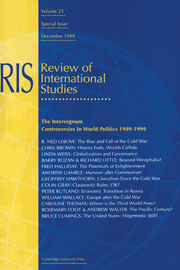Book contents
- Frontmatter
- Contents
- Acknowledgements
- Foreword
- Notes on contributors
- Introduction
- 1 The Rise and Fall of the Cold War in Comparative Perspective
- 2 History Ends, World Collide
- 3 Globalization and National Governance: Antinomies or Interdependence?
- 4 Beyond Westphalia?: Capitalism after the ‘Fall’
- 5 The Potentials of Enlightenment
- 6 Marxism after Communism
- 7 Liberalism Since the Cold War: An Enemy to Itself?
- 8 Clausewitz Rules, OK? The Future is the Past—with GPS
- 9 Mission Impossible? The IMF and the Failure of the Market Transition in Russia
- 10 Europe after the Cold War: Interstate Order or post-Sovereign Regional System?
- 11 Where is the Third World Now?
- 12 Whatever Happened to the Pacific Century?
- 13 Still the American Century
- Index
12 - Whatever Happened to the Pacific Century?
Published online by Cambridge University Press: 05 November 2009
- Frontmatter
- Contents
- Acknowledgements
- Foreword
- Notes on contributors
- Introduction
- 1 The Rise and Fall of the Cold War in Comparative Perspective
- 2 History Ends, World Collide
- 3 Globalization and National Governance: Antinomies or Interdependence?
- 4 Beyond Westphalia?: Capitalism after the ‘Fall’
- 5 The Potentials of Enlightenment
- 6 Marxism after Communism
- 7 Liberalism Since the Cold War: An Enemy to Itself?
- 8 Clausewitz Rules, OK? The Future is the Past—with GPS
- 9 Mission Impossible? The IMF and the Failure of the Market Transition in Russia
- 10 Europe after the Cold War: Interstate Order or post-Sovereign Regional System?
- 11 Where is the Third World Now?
- 12 Whatever Happened to the Pacific Century?
- 13 Still the American Century
- Index
Summary
Typical of the opposing trends that have been a part of the decade 1989 to 1999, many of the states in the Asia-Pacific in these ten years have shifted from ‘miracle’ status to crisis. From being the political and economic model for other countries in both the developing and the developed world, they now signal how best to avoid the less savoury pitfalls of rapid development. The miracle status, deriving from two decades or more of impressive growth rates on the basis of a presumed distinctive politico-economic model, was supposed to herald a Pacific Century. The key characteristics of this new era were a newfound regional coherence and a related transfer of economic and above all political power from the Atlantic community towards Asia-Pacific. The crisis, in turn, is seen as marking the end of that shift in the economic and political centres of gravity.
Despite the starkness of these contrasts, we argue that the idea of the Pacific Century was always overstated in economic, but especially in political terms. Two particular currents of thought in international relations contributed to this overstatement: developments in international political economy encouraged the presumption of a close correspondence between economic and political change, and the resurgence of interest in culture led to a search for the distinctively Asian values that were perceived to be at the root of that economic success. This tendency to overstatement has also shaped reactions to the economic crisis that is seen as beginning in 1997.
- Type
- Chapter
- Information
- The Interregnum: Controversies in World Politics 1989–1999 , pp. 245 - 270Publisher: Cambridge University PressPrint publication year: 2000



